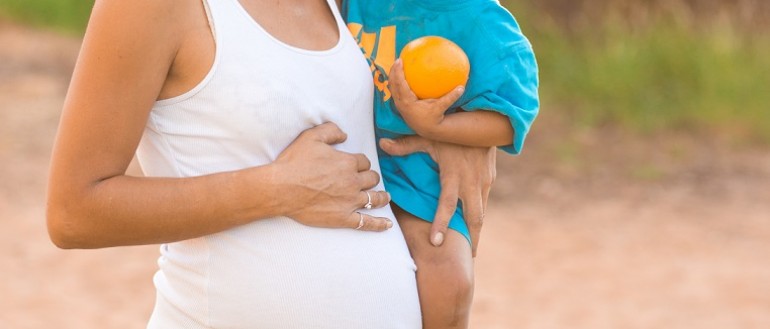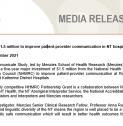Funders:
- Medical Research Future Fund (MRFF)
Collaborators:
- Northern Territory Department of Health
- Queensland Health
- University of Melbourne
- Danila Dilba Health Service
- Cairns Hospital
- The University of Queensland
- South Australian Health and Medical Research Institute Ltd
- Baker Heart and Diabetes Institute
- Australian Diabetes Society
- Diabetes Australia
- Australasian Diabetes in Pregnancy Society
- Monash University
- Apunipima Cape York Health Council
- Central Queensland University
- AMSANT
- Australasian Diabetes Educators Association
-
The Australian | Spotlight on Indigenous diabetes crisis
A new study has found Indigenous children in Northern Australia suffer youth-onset type two diabetes at rates at least 10 times higher than previously thought, and possibly above those anywhere else in the world.
-
Youth-onset type 2 diabetes in the NT exceed international figures
The study uncovered what is arguably the highest reported prevalence in any population of youth internationally within the past 25 years and ten times higher than previously reported in Australia.
-
Diabetes in poverty-stricken pregnant women in the NT, highest in the world
Researcher and lead author Dr Matthew Hare said, for these women, poverty stricken and living in some of the most isolated regions of Australia, fresh and healthy food is often not for sale where they live or it is unaffordable.
-
Media release | The Hon Greg Hunt MP
$27 million to boost research in preventive and public health. A media release about an Australian Government investment in vital research to help promote better health and prevent people from getting ill.
A life course approach to reduce intergenerational diabetes in remote northern Australia through improved systems of care and consumer engagement
Aims:
- To improve child and maternal health outcomes for women with diabetes in pregnancy by implementing best practice models of the NT & FNQ Diabetes in Pregnancy Registers, using them in routine care as continuous quality improvement tools.
- To reduce diabetes-related risks before, during and after a pregnancy with diabetes by co-designing, implementing and evaluating a new multi-component intervention.
Objectives:
- Expand and further develop the already established Diabetes in Pregnancy registers across NT & FNQ – with a focus on increasing coverage, improving efficiency and embedding as part of routine clinical care
- Enhance the use of Registers as a clinical quality improvement and service planning tool, to support change to clinical practice and improve maternal and child health outcomes
- Increase community engagement through participatory action research and early life course approach, with a focus on co-design and pilot of tools to promote weight management and reduce diabetes risk in the first 2,000 days.
Summary:
The Diabetes across the Lifecourse: Northern Australia Partnership, led by Professor Louise Maple-Brown at Menzies has received funding from the Medical Research Future Fund to enhance the NT & FNQ Diabetes in Pregnancy Clinical Registers and Models of Care work. This project focuses on improving maternal and child health in the critical first 2000 days. The Partnership started in 2011 and is a collaboration between research institutes, policymakers and health services (both government-run and Aboriginal Community Controlled Health Services), which now includes NT, FNQ and the Kimberley region of WA. Key components of the Partnership include Diabetes in Pregnancy (DIP) Clinical Registers and Models of Care, the PANDORA (Pregnancy and Neonatal Outcomes in Remote Australia) longitudinal cohort study, youth onset type 2 diabetes and community-based diabetes prevention in children.
Implications for policy and practice:
We will be working with Aboriginal and Torres Strait Islander women and communities to co-design and implement activities to support a healthy start to life. We know that woman’s health prior to and during pregnancy impacts her child’s health (in the immediate and long term). We anticipate our research will contribute to the evidence base about what works for remote Aboriginal and Torres Strait Islander women to have healthy pregnancies and healthy babies.
Our research has found:
Diabetes in pregnancy affects the short- and long-term health of both mother and baby and offers a key opportunity to break the intergenerational epidemic of type 2 diabetes, obesity and cardiovascular disease in Aboriginal and Torres Strait Islander communities. This project builds on the work of the Diabetes across the Lifecourse Partnership. The Diabetes in Pregnancy Clinical Registers and affiliated projects in the NT and Far North Queensland have supported enhanced screening of diabetes in pregnancy and improved models of care for women with diabetes in pregnancy.
Chief investigator:
Project managers:
- Contact Tara Dias - Northern Territory
- Contact Kirby Murtha - Far North Queensland
Project dates:
The project commenced in June 2020 and will be completed by May 2025.
Visit the dipp.org.au website.





